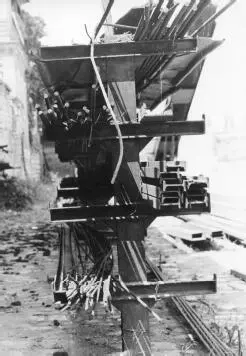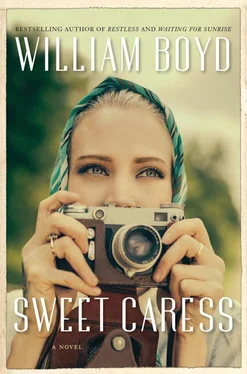Enthused, Charbonneau suggested the Savoy-Plaza Hotel at seven o’clock. I caught a cab up to Central Park South and met him in the lobby. He took pernickety care over the choice of wine and ordered a steak so rare it was effectively raw, to my eyes. He asked me lots of questions about myself — where was I born, who were my parents — and, enjoying this gentle interrogation, and the second bottle of wine, I found myself opening up to him, telling him the story of the Grösze and Greene fiasco and, indirectly (I wasn’t wearing my engagement ring), that I was having something of an affair here in New York.
‘And what about your poor fiancé in England?’
‘Well, he’s more of a friend than a fiancé. It’s a useful ruse.’
We were at the end of the meal. Charbonneau was on his second brandy and second coffee. I was sipping at a glass of port.
‘Enough about me,’ I said, fishing in my bag for my cigarettes. ‘Tell me about your novel.’
He shrugged. ‘It’s just a little thing. A hundred and thirty pages. I wrote it seven, no, eight years ago but now they’ve published it in English so I have to remember what I wrote. . It’s about a man who has stage fright — le trac , we call it — but stage fright whenever he has to make love.’
‘He’s impotent.’
‘No, no. Have you ever had stage fright? It’s a terrible, physical sensation. You can still go on stage, you can still perform but, I assure you, le trac véritable . .’ He gestured with his cigarette, making a tightening spiral. ‘It seizes your entire being.’
‘Is it an autobiographical novel, then?’
He laughed, loudly enough for nearby diners to turn and stare.
‘I think you are a very bad young woman, Miss Clay. Méchante. No, I’ve had stage fright but only in the theatre. When I was very young.’
‘That’s a relief,’ I said.
He stared at me and I saw ash fall carelessly from his cigarette on to his sleeve. He didn’t bother to brush it away.
‘Actually, I’m taking a bit of a holiday from sex,’ he said. ‘Personally speaking.’
‘Really?’
‘Yes. I’m a bit bored with the whole brouhaha , what do you say? The surrounding nonsense.’
‘I see.’
‘Yes. These days I’d rather have a conversation with an interesting and beautiful young woman’ — he leant forward and whispered — ‘than fuck her.’
It was a test, of course — but Charbonneau could have had no idea that I’d worked with the foul-mouthed Greville Reade-Hill and so I listened unmoved and unperturbed.
‘It’s not an either-or, you know,’ I said, then leant forward and whispered to him myself. ‘You can still have a conversation with the people you fuck.’
He sat back in his chair, an uncertain smile on his face. I think that, for a very rare moment in his life, Jean-Baptiste Charbonneau found himself at a loss for words. He said nothing, just pointed his finger at me and wagged it in amused admonishment.
*
THE BARRANDALE JOURNAL 1977
And so my New York, American life progressed in its alternating, vaguely satisfying, vaguely unsatisfying, way. I saw Cleve whenever he could free himself from his wife and family and, as compensation when he wasn’t free, I began to have a regular dinner date with Jean-Baptiste Charbonneau — once a week or so.
I remember a trip Cleve and I made to California for the opening of the Santa Rosa Bridge in Sonoma — one of the first big New Deal projects to be completed — and we managed to spend a whole four days together, the longest consecutive time we’d ever passed in each other’s company. We took a Boeing Air Transport 247 across country, my second flight in an aeroplane, and then my third flight back home to New York. Perhaps because I was with Cleve, sitting beside me, and those four days were bracketed by long cross-country flights with many take-offs and landings, I found I loved flying — despite the rocking turbulence we encountered. I was never alarmed or fearful though I suppose I might have had cause to be so: instead I was intoxicated by the improbability of being in these shiny metal machines powering themselves into the air, looking down on the land we soared over, slicing through clouds into the luminous blue above.
I remember the first night Cleve and I made love. I knew it was bound to happen — it was why I had come to America, after all, though I have to admit that the money was an extra inducement. He drove us north-east out of Manhattan to Westchester County to a roadhouse on Highway 9 called the Demarest Motor Lodge. We ate an indifferent meal but we hadn’t come all this way for the food. There were eight double rooms with attached bathrooms on the floor above.
Cleve said: ‘I could drive you home but I took the precaution of booking a couple of rooms here, just in case we were too tired.’
I said: ‘Now you mention it I am feeling a bit too tired to go back to Manhattan. What a good idea.’
And so we went upstairs to our rooms. Five minutes later Cleve knocked softly on my door.
I remember we made love twice that night, and then once again in the morning. Cleve was adamant that he should wear a contraceptive: he had come prepared. And I remember, on the drive back to Manhattan, the almost drug-like mood of happiness I was in. I hunched over on the bench seat and leant up against Cleve as he drove, feeling his warmth, my hand on his thigh. I looked through the windscreen at the commuter traffic heading back into Manhattan idly noting details: the colours of the cars — mushroom, mouse-grey, glossy black, dull crimson — and the sky with great rafters or bars of cloud set against the blue, almost as if measured and deliberately spaced. I looked with unknowing, innocent eyes, it seemed to me and, as I touched my throat, I felt my skin was hypersensitive, tingling, frictively alive, because, I assumed, of the feeling of bliss inside me: it was almost as if I were coming down with flu.
I remember Phil Adler asking me if I was all right when I came into the office. Why do you ask? You just seem different, as if you’re not quite here, he said. You take about three seconds to answer my questions. Oh. Then I said I wondered if maybe I was coming down with flu. He sent me to photograph the Brooklyn Bridge for the third time. There were a lot of repairs going on and I strayed from my brief. It was one of my first ‘abstract’, compositional photographs. Maybe I was inspired. Phil said it was unusable.

MY DINNERS WITH CHARBONNEAU took on a pattern. Missing Paris, he always tried to seek out a French restaurant and, however well we dined there, he always claimed to be vehemently disappointed; that what had been presented was a travesty of French cooking, an American fiasco. I often contradicted him just to set his indignation raging — to my British palate everything seemed delicious. He was very analytical about the food he ate — even the bread rolls and the salt claimed his gourmet’s focussed attention. Almost without trying I began to learn a lot about what one could demand from the necessities of eating: the meat, the fish, the vegetables that we masticated and swallowed to allow us to live. But Charbonneau gave the process so much forensic thought it seemed almost unhealthy to me.
In search of the perfect French cuisine in New York we ate our way through the French restaurants that the Village had to offer: Le Champignon, Charles, Montparnasse — and numerous others. Pas brillant , was his mildest judgement.
One night we were in the Waldorf Cafeteria on 6th Avenue, where Charbonneau claimed to have tracked down an ‘acceptable’ Bordeaux, a 1924 Château Pavie. He was in a strange unruly mood and had already criticised me for my choice of lipstick — ‘It doesn’t suit you, it makes your mouth look thin’ — but I paid no attention. I was in an odd state of mind myself as I hadn’t seen Cleve for over three weeks — he was off on a GPW trip to Japan and China — and I wasn’t at my most tractable.
Читать дальше













